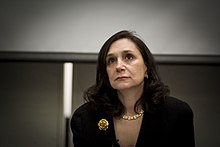Sherry Turkle
Sherry Turkle (born June 18, 1948 in New York ) is an American sociologist and professor of Science, Technology and Society at the Massachusetts Institute of Technology (MIT). Her research focuses on psychoanalysis and culture and the psychological relationship that people have with technical devices, especially computers .
Life
Turkle began her research in 1976, which led to The Second Self in 1984. She was interested in what computers mean to people of different ages and genders and how they influence their self-image. She examined children, hackers and members of the AI ( artificial intelligence ) community. In doing so, she compared the emergence of computer culture to the success of psychoanalysis in American culture, as both provided vocabulary and metaphors with which people tried to understand who they were.
Turkle is positive about the possibilities of technology and the Internet. But it also draws attention to the fact that human skills such as thinking, listening and speaking can be suppressed.
In 2014 Turkle was elected to the American Academy of Arts and Sciences .
- Psychoanalytic Politics: Jacques Lacan and Freud 's French Revolution . New York: Basic Books, 1978
-
The Second Self: Computers and the Human Spirit . 1984
- The dream machine . The computer as a second self . Translation by Nikolaus Hansen. Rowohlt, Reinbek 1984, ISBN 3-499-18135-5
- The dream machine . About the emergence of computer culture . Translation by Nikolaus Hansen. Rowohlt, Reinbek 1991, ISBN 3-498-06482-7
-
Life on the Screen: Identity in the Age of the Internet. 1995, ISBN 0-684-83348-4 .
- Life on the Net: Identity in the Age of the Internet . Translation by Thorsten Schmidt. Rowohlt, Reinbek near Hamburg 1998
- The second self - computers as a cultural and educational challenge . In: Hartmut Mitzlaff (Ed.): Internationales Handbuch Computer (ICT), Elementary School, Kindergarten and New Learning Culture . Schneider Verlag, Hohengehren 2007, ISBN 978-3-8340-0142-9 , pp. 30-40
- Falling For Science: Objects in Mind . 2008
-
Alone Together . Basic Books, 2011, ISBN 978-0-465-01021-9
- Lost among 100 friends: How we are mentally stunted in the digital world . Translation by Joannis Stefanidis. Munich: Random House, 2012
- Reclaiming conversation. The Power of Talk in a Digital Age . New York: Penguin Press, 2015
literature
- Harry Henderson: Encyclopedia of Computer Science and Technology. Infobase Publishing, 2009, ISBN 978-1-4381-1003-5 , p. 482 ( limited preview in Google Book Search).
Web links
- Literature by and about Sherry Turkle in the catalog of the German National Library
- biography
- Sherry Turkle's website
- Review of Life on the Screen published in Socialism Today
- interview
- Interview at priory.com
Individual evidence
- ↑ Peter Haffner: Less Internet, please! The internet has brought us a lot. Unfortunately, there is also the possibility of not thinking. Sherry Turkle, professor at MIT, takes stock. In: Das Magazin , 26, 2012
| personal data | |
|---|---|
| SURNAME | Turkle, sherry |
| ALTERNATIVE NAMES | Zimmerman, Sherry (maiden name) |
| BRIEF DESCRIPTION | American psychologist |
| DATE OF BIRTH | June 18, 1948 |
| PLACE OF BIRTH | new York |
